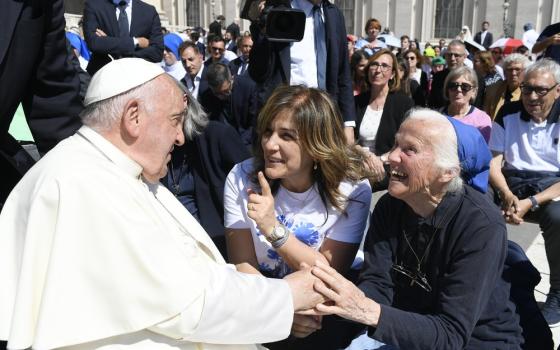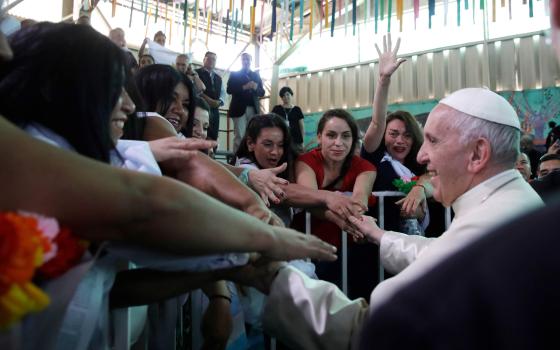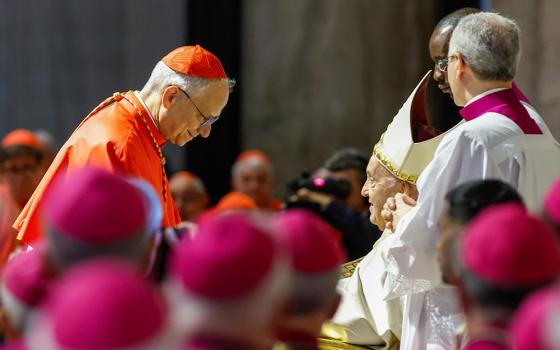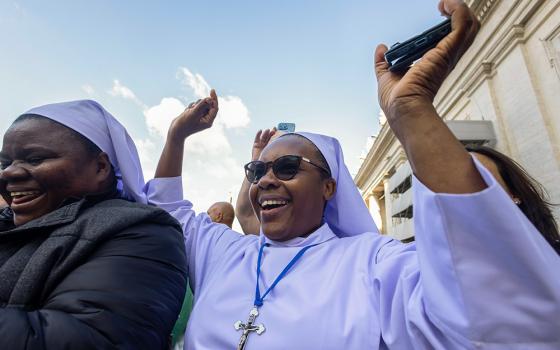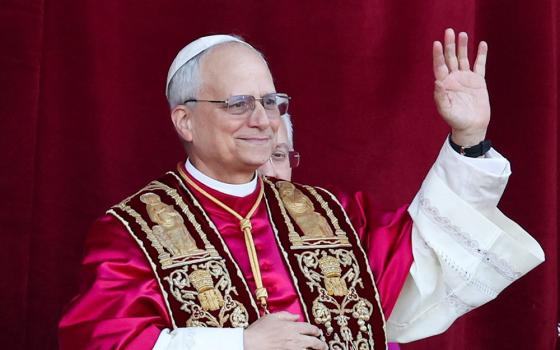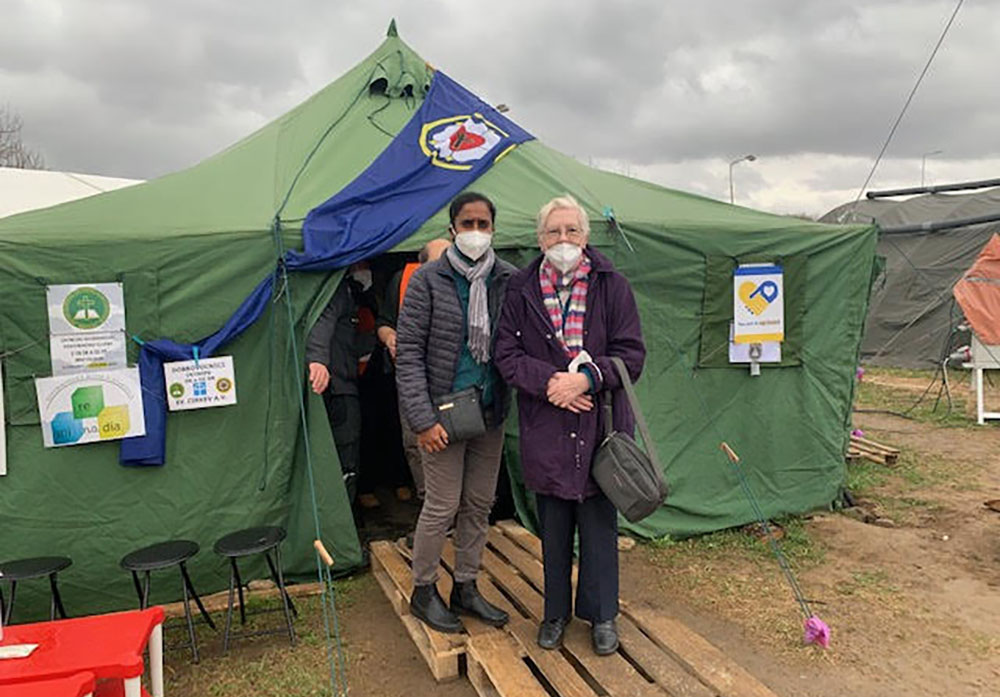
Presentation Sisters Rupa and Louise at the Ukraine border with Slovakia, where they were distributing food to Ukrainian refugees. (Anne McNamara)
On March 17, 2022, after necessary legal preparations were made, the Presentation Sisters in Slovakia signed a contract giving use of their unoccupied flat in Bratislava to Ukrainian refugees through a Slovak foundation. This three-bedroom flat is within easy access of the city, bus stops, train station and schools.
The need for accommodation and safety is vital for many families fleeing the war in Ukraine, and even now — more than a year since the invasion by Russia — people daily stream across the border into Slovakia. The foundation chosen was headed by Dr. Vladimír Krčméry, who with a large number of volunteers worked with refugees and provided a nightly soup kitchen and medical aid for the homeless in Bratislava.
Krčméry, who died in December 2022, was also the founder of St. Elizabeth College of Health and Social Work in Bratislava. The college provides valuable medical training in the field of tropical medicine and runs development and humanitarian projects in Africa, Latin America and Southeast Asia.
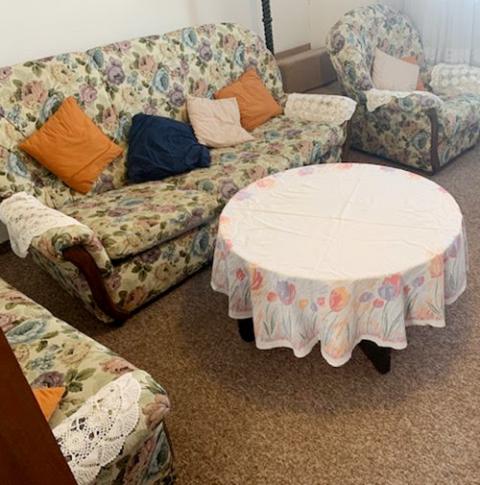
The living room of the Presentation Sisters' flat in Bratislava, Slovakia (Anne McNamara)
Krčméry and his team chose a family who had fled the city of Dnipro, Ukraine, during heavy bombing and shelling. The family moved into our flat on March 19, 2022. They are two blood sisters — identified only as J. and E. — with three girls who were aged 11, 8 and 3 when they arrived. The children were initially shy and frightened, having traveled more than 2,000 kilometers by bus, train and on foot, going through many checkpoints.
E. spoke to me about her fears for her husband and family. She spoke about hearing heavy fighting and missile launches every day. She also left behind her elderly mother and grandmother.
The government of the Ukraine decreed full military mobilization, so men have military obligations and are prevented from leaving the country. Both J.'s and E.'s husbands and male members of their extended family are serving in the army.
They told us that Dnipro — very strategic for the Russians as it bridges eastern and western Ukraine over the Dnieper River — is seldom out of the news. It is experiencing fighting on all three sides, surrounded by Russian forces. As late as Jan. 14, missile strikes were reported in Dnipro, where many were injured — including children. The women heard daily air-raid sirens and explosions, and saw sandbags stacked around the city of more than 1 million people. They said people were sheltering everywhere and wounded soldiers were coming to the hospitals every day.
They both spoke of their sincere gratitude to the Presentation Sisters for the use of the flat; when they heard of its availability they described it as "incredible," "unbelievable" and "heaven away from hell." They speak continually of their sadness that their families have stayed behind in the Ukraine.
All three children have begun attending school in Bratislava, and the adults have found jobs.
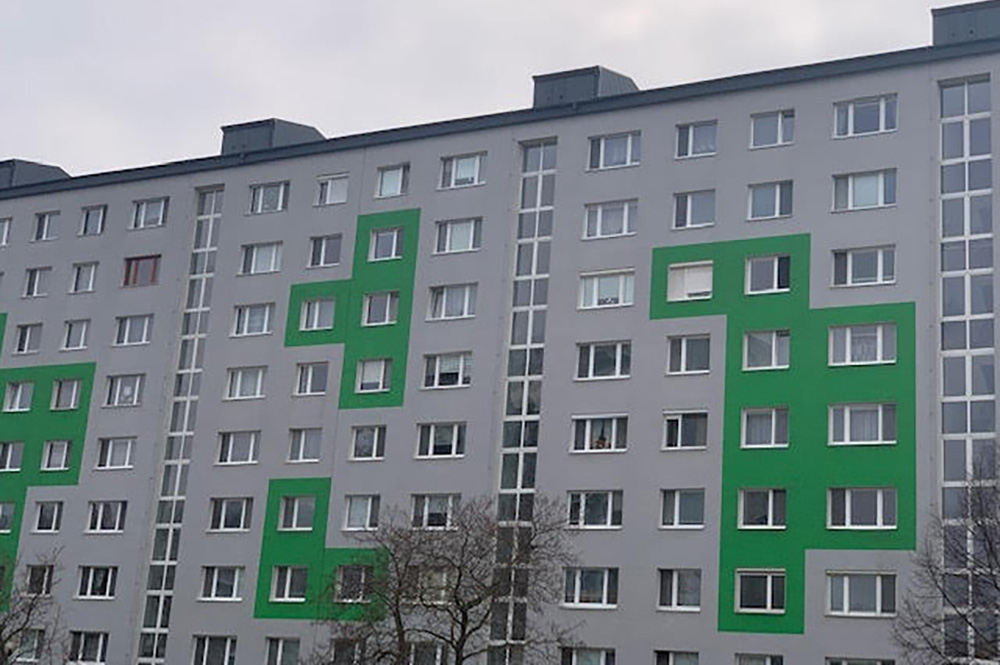
The Presentation Sisters gave use of their unoccupied flat in this building in Bratislava, Slovakia, to Ukrainian refugees. (Anne McNamara)
The U.N. refugee agency, UNHCR, records that since the Russian invasion, more than 13 million Ukrainians have fled their homes by train, bus, car, or on foot. More than 8 million have left the country and are scattered across Europe. Most are women and children, at a higher risk of violence and abuse, including human trafficking, smuggling and illegal adoption.
Reception centers have been set up at all border countries, where they are given food, medical care, information and accommodation if necessary. Many seek advice about onward travel. The European Union has granted Ukrainians who flee the war a right to stay and work throughout its 27 member states for up to three years. Ukrainian refugees will also receive social welfare benefits and access to housing, schools and medical treatment.
The Slovak Republic and Ukraine have a visa-free agreement, so those with Ukrainian passports do not have to have a visa to enter Slovakia. The main train station in Bratislava, Slovakia's capital, is a crossroads for refugees from the Ukraine. They can go on from there directly to Budapest, Frankfurt, Prague, Vienna, Paris, Lisbon. Free trains were added to these destinations for refugees from the Ukraine.
It isn't clear how many have decided to stay in Slovakia, a country of around 5.5 million people.
Some arrive in Slovakia with a clear destination in mind — with family or friends — and others are given temporary accommodation in Slovakia in hotels, guesthouses, schools, church buildings and private homes.
Time will tell how long these refugees will be displaced, but many want to leave as quickly as possible and return to their homeland and families.
Advertisement
Vyšné Nemecké is the usual border crossing from eastern Slovakia to the Ukrainian city of Uzhhorod. Two other active crossings are Ubl'a and Vel'ké Slemence. On April 9, 2022, Sisters Louise, Rupa and I traveled by car to Vyšné Nemecké — a distance of 150 kilometers from Spišské Podhradie where we live — taking food, toiletries and blankets. We were met by a Slovak soldier guarding the border crossing. The soldier was friendly and directed us to a tent accepting donations for incoming refugees.
We entered the tent and met an Irishwoman who was a volunteer with the Red Cross and had traveled from Dublin to help. Other volunteers spoke about the waves of people who come over the border, some in the evening or at night or early morning.
Many children are naturally frightened and upset, and there were welcome packs for them, to try to distract them from the trauma of the crossing and the prospect of further journeys around Europe.
The care, thoughtfulness and concern shown to all refugees crossing — from police, fire brigade, ambulances, medical staff, soldiers, volunteers and donors — was so obvious. The Slovak Migration Office also has a tent there explaining to people their legal rights and responsibilities, and checking and helping with documentation. In Vyšné Nemecké, there are a large number of aid groups helping people crossing over from the Ukraine by day or night.
An EU study in June showed that about 10,000 Ukrainian children attend school in Slovakia, creating a number of challenges. According to Slovak teachers, the biggest problems include language, trauma, isolation from peers, and lack of stability.
An online survey conducted in April 2022 found that the majority of Slovaks agreed with their country's official response to Russia's invasion of Ukraine. However, as the war entered its second year, surveys began to show Slovak support declining, mainly due to rising prices and the economic situation.
But Slovakia for many is truly a close haven at this time. Let us pray with Psalm 16: "Keep them safe, O God; you are their hope."

